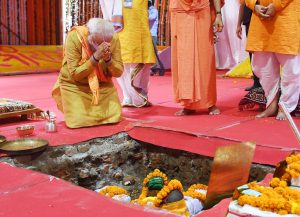With the consecration ceremony of the Ram Mandir set to take place on January 22, much has been made about who will be attending the ceremony and who will not.
The responsibility for handing out the invitations to the ceremony is being handled by the Shri Ram Janmbhoomi Teerth Kshetra Trust. The trust was set up by the government of India in order to facilitate the construction of the Ram Mandir. The composition of the trust members is worth exploring. The vice president of the Vishwa Hindu Parishad (VHP), Champat Rai, was elected unanimously as the general secretary of the trust.
The VHP, being a member of the Sangh Parivar group, the family of Hindu nationalist organizations led by the Rashtriya Swayamsevak Sangh (RSS), played an important role in the destruction of the Babri Masjid alongside members of the Bharatiya Janata Party (BJP). The current government, led by Prime Minister Narendra Modi of the BJP, has legitimized the illegal destruction of the mosque in which the political and militant right-wing organizations took part. Their participation in the trust serves as evidence of the same.
While nominally the trust is handling the distribution of invites, we frequently see members of the BJP and RSS personally go to the houses of celebrities to present an invitation. This shows that it is not the trust alone that is organizing the consecration ceremony; there is extensive participation from the side of the current central government and the larger right-wing forces of India.
The national spokesperson of the VHP, Vinod Bansal, stated that the aim is to ensure that there is no discrimination on the basis of political ideology, and that irrespective of political affiliation, all would be invited to the ceremony. At odds with this supposed magnanimity, already the right-wing is attacking those who are not attending the consecration ceremony. Alok Kumar, the international working president of the VHP, said that invitations had been provided by their side, and if the opposition parties choose not to come, people would assume they did not attend so for the sake of their minority vote bank. Thus, Kumar said, they would lose the core Hindu support.
The senior leadership of the Communist Party of India (Marxist) refused to participate in the ceremony, saying that it was “straightforward politicization of the religious beliefs of the people, which is not in consonance with the Constitution.” Meenakshi Lekhi, India’s minister of state for external affairs and culture, responded by saying that only those called by Lord Ram would be attending the ceremony in Ayodhya.
There is a clear demarcation being made between those who will be attending the consecration ceremony and those who will not be. The strategy of the BJP and its allies is evident, as they continuously malign those not attending by claiming that they are not dedicated to the Hindu cause. This fuels their nation-building narrative, which claims that only the BJP-RSS nexus will protect the Hindu faith and integrate it into the nation
However, for all insistence by the central government that the Ram Mandir consecration ceremony is not a political event but a religious one, the recent decline of the invites by four of the top spiritual leaders of the Hindu faith comes as a major blow to the argument. One of the spiritual leaders stated that he declined the invite as the ceremony was not going to be in line with scriptural guidelines. He argued that the inauguration had become a political show, saying that the prime minister should have no role in performing the “Pran Pratishtha” (the ceremony by which an idol is consecrated in a temple) and, furthermore, that it would lessen the radiance of the idol.
Additionally, another spiritual leader declined to attend the event, stating that a partially constructed temple cannot have a consecration ceremony – a point which the Congress, India’s largest opposition party, has been amplifying to justify its decision not to attend the ceremony. From the reasons given by the spiritual leaders in declining the invitation, it becomes fairly evident that the consecration ceremony of the Ram Mandir is being rushed in order to gain political mileage ahead of the general elections. The BJP wants to show that its agenda has been fulfilled, 30 years after the Babri Masjid was demolished.
Additionally, the central role that the prime minister has in the consecration ceremony – a role that should ideally be fulfilled by a religious leader – further goes to show that the whole motive of this exercise is to solidify Modi as the leader who delivered justice to the Hindus of India, who had earlier been living in the oppressive colonial shadow of the Mughal and British rule.

































